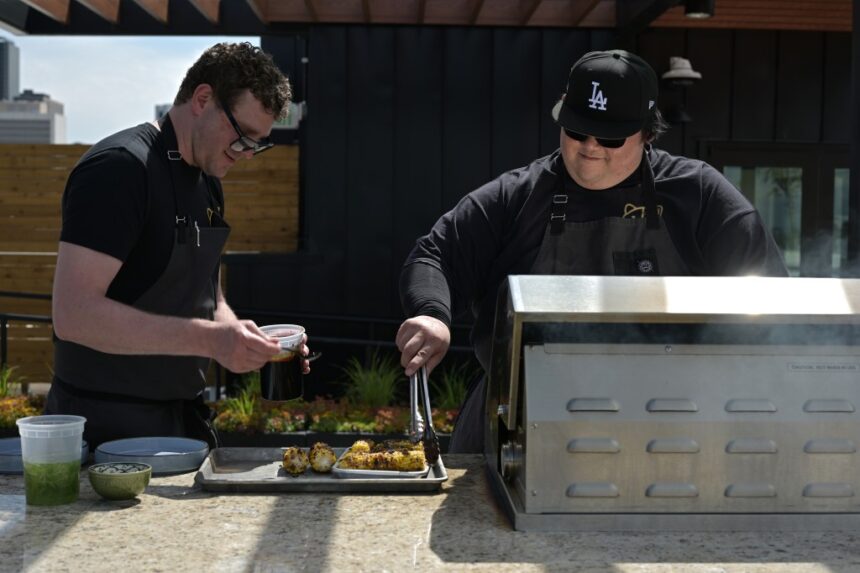For decades, Fourth of July celebrations in America have been synonymous with barbecues and potlucks. The traditional spread includes hot dogs, hamburgers, macaroni and cheese, potato salad, watermelon slices, and plenty of cold beverages. As the day turns into night, ice-cream sandwiches, popsicles, and pie make their appearance, accompanied by the bright lights of fireworks.
However, the culinary landscape of America is diverse, with immigrants adding their own flavors and traditions to the mix. In Colorado, a state with a strong Hispanic influence, the Fourth of July feast may include green and red chile, corn, beans, and tortillas – foods that have long been staples in Hispanic communities.
Anthropologist Carole Counihan explored the Fourth of July food traditions in Colorado’s San Luis Valley, noting dishes like posole, deviled eggs, and pasta that represent a global fusion of flavors, with a focus on grilled meats.
In Denver, a group of chefs share their personal Fourth of July menus, blending their cultural backgrounds with American traditions. Manny Barella of Riot BBQ, originally from Monterrey, Mexico, brings his love for barbecue culture to the table with dishes like carne asada and ribs al pastor. Erasmo “Ras” Casiano of Xiquita recreates backyard BBQ gatherings from Mexico with carne asada, chicken, salsas, tortillas, and rice.
Darren Chang of Pig and Tiger adds a Taiwanese twist to Fourth of July celebrations with his Taiwanese street corn, using fresh Olathe corn and a vegan version of his dad’s shacha sauce. Anna and Anthony “Ni” Nguyen of Sap Sua combine Americana-style BBQ pork skewers with Vietnamese flavors, including pickles and bratwurst.
Munetoshi Taira of Sushi by Scratch Restaurants infuses Japanese flavors into classic American Independence Day dishes, creating a harmonious blend of cultures. And Darrel Truett of Barolo Grill shares his love for Italian cuisine, enjoying Panzanella, an Italian bread salad, during his annual Fourth of July trip to Italy.
These chefs showcase the diversity of American food traditions, highlighting the fusion of flavors and the importance of gathering with family and friends on the Fourth of July. Whether it’s traditional American fare or international twists, the spirit of celebration and unity through food remains at the heart of this patriotic holiday. The Impact of Artificial Intelligence on Business
Artificial intelligence (AI) has become an increasingly important tool in the business world, revolutionizing the way companies operate and make decisions. From streamlining processes to improving customer interactions, the impact of AI on business is undeniable.
One of the key ways AI is transforming business is through automation. AI technology can perform repetitive tasks more quickly and accurately than humans, freeing up employees to focus on more strategic and creative work. This increased efficiency can lead to cost savings and improved productivity for companies.
AI is also being used to improve customer interactions. Chatbots powered by AI can provide instant responses to customer inquiries, enhancing the customer experience and increasing customer satisfaction. AI can also be used to personalize marketing efforts, delivering targeted messages to customers based on their preferences and behaviors.
In addition, AI is helping businesses make more informed decisions through data analysis. AI algorithms can analyze large amounts of data to identify patterns and trends, providing valuable insights that can be used to drive business strategy. This data-driven approach can help companies better understand their customers, optimize operations, and identify new opportunities for growth.
AI is also being used to enhance cybersecurity measures. AI technology can detect and respond to cyber threats in real-time, helping companies protect their sensitive data and prevent security breaches. By leveraging AI for cybersecurity, businesses can reduce the risk of costly cyber attacks and safeguard their reputation.
Overall, the impact of AI on business is profound and multifaceted. From automation to customer interactions to data analysis, AI is transforming the way companies operate and helping them stay competitive in an increasingly digital world. As AI technology continues to advance, businesses that embrace and leverage AI will be well-positioned to thrive in the future.








